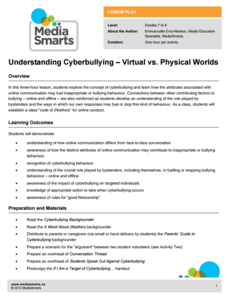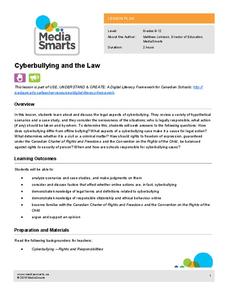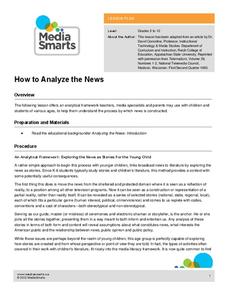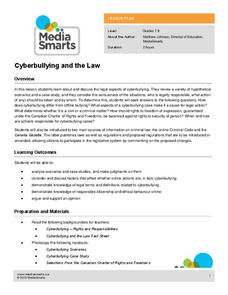Media Smarts
Understanding Cyberbullying — Virtual vs. Physical Worlds
Spend a few days discussing cyberbullying with an engaging lesson plan. Opening discussion questions get the conversation started while quotes and articles continue thoughtful dialogue. Small group activities and role-play scenarios...
Media Smarts
Unit Two: Celebrities and World Issues
Develop media smarts by considering the power of celebrity involvement in world issues. A look at the work of such celebrities as Angelina Jolie, Oprah, and Bono prepare learners to develop their own media campaign for a global...
Media Smarts
Truth or Money
Two compelling texts about tobacco companies' influence over editorial content in print media introduce readers to the concept of advertising censorship. After study and discussion, class members compose a mock "final column" by a...
Media Smarts
The Impact of Gender Role Stereotypes
One of three lessons on gender stereotype, this resource from the Media Awareness Network discusses the violence that is inflicted on men and women as they try to live up to the stereotypes of their gender. The section on women focuses...
Media Smarts
Movie Heroes and the Heroic Journey
An exciting twist on the study of the classical hero and the heroic quest! Using film to explore modern-day tales of heroes, the resource contains complete, ready-to-use lesson plans for as many as twelve days of instruction. Throughout...
Media Smarts
Violence and Video Games
Widespread video gaming makes this content relevant and high interest. Developing youth awareness about the impact of violence in games is important to promote literacy, critical thinking, health, and consumer awareness. After reading...
Media Smarts
First Person
High schoolers explore the relationship between video games and actual population. Example: A 2005 study showed Latino youth play at higher rates than other groups, but there are no Latino playable characters. They watch a brief video...
Media Smarts
Challenging Hate Online
Looking at the different ways organizations disseminate their messages using digital media leads to developing a digital anti-hate media campaign. Although some of the resources reflect the Canadian developer, the links provide...
Media Smarts
Cyberbullying and the Law
Research, role-playing, and reflection are the three “R’s” that form the basis of an examination of Cyberbullying. Although based on the Criminal Code of Canada, the included scenarios and case studies provide valuable resources for a...
Media Smarts
Broadcasting Codes
Let your learners be the judges for a series of case studies that focus on broadcast codes in Canada. In order to familiarize your class with the codes and guidelines that govern the broadcasting industry, in particular Canada's...
Media Smarts
How to Analyze the News
Teach kids how to watch television, specifically the news, with this creative idea for learners of all ages from the Media Awareness Network. The elementary school plan focuses on presenting news as a story and uses Jon Scieszka's story...
Media Smarts
Cyberbullying and the Law
Dealing with the very topical subject of cyberbullying, this lesson plan will surely create some engaged discussion in your classroom. Young learners discuss the laws concerning cyberbullying in Canada, and then respond to a series of...
Media Smarts
Kellogg Special K Ads
Foster class discussion about body image with the resources and questions provided here. Focus on Special K's "look good on your own terms" ad campaign. Learners start by reading about this campaign and analyze a series of print ads,...
Media Smarts
Media Awareness Network: Hate or Debate?
Discuss the difference between legitimate debate on a political issue and arguments that are based on hate through a science-fiction scenario that shows how a controversial issue can be discussed in both ways. Then learn how purveyors of...
Media Smarts
Taking Charge of TV Violence
Encourage your class to become aware of the violence that is present in children's television programs and how this violence can influence children. Do this by holding the planned class discussion in this lesson plan and providing...
Media Smarts
Gender Messages in Alcohol Advertising
Make your students critical consumers of media, and foster an awareness of how culture is reflected and shaped by media. This resource covers how alcohol advertising presents and promotes gender stereotypes. After a discussion on...
Media Smarts
Tobacco Labels
Adolescents compare and assess the efficacy of tobacco product health warning labels from around the world. In groups, they invent warnings and create labels that would be effective for teens and children. Discussion covers advertising...
Media Smarts
Thinking like a Citizen
Explore the influence social activism can have on important issues, and create a class full of young citizen activists. This plan calls for learners to participate in a whole class discussion and brainstorm about ways to effectively...
Media Smarts
Cinema Cops
A study of how public perception is both reflected and influenced by film and television, this instructional activity helps students develop an awareness of audience as well as a critical view of media. Depictions of police in television...
Media Smarts
TV Dads: Immature and Irresponsible?
Examine gender stereotypes on television, focusing on fathers portrayed in sitcoms and advertising. Questions on a handout direct learners to consider the types of fathers they see on television and one advertisement is highlighted as...
Media Smarts
Violence on Film: The Ratings Game
Learn about film and TV ratings systems in Canada (includes a comparison to the MPAA system) and how they influence appropriate viewing for youths. A detailed commentary about the film Seven pointed at revealing flaws in ratings systems...
Media Smarts
Bias
See how bias operates firsthand. Half of the class reads one article while the other half reads another article on the same event. The obvious differences emerge when the two sides talk about their observations though. Several handouts...
Media Smarts
Hoax? Scholarly Research? Personal Opinion?
Divide your class into groups to study the validity of online sources. One group looks at the authority and accuracy of four listed websites, another group looks at advocacy and objectivity, and the third group looks at currency and...
Media Smarts
Selling Tobacco
Take a look at tobacco advertising techniques through the decades. Students analyze the differences in strategies, and write an essay on the advertising history of one brand of tobacco, how tobacco advertising has changed over time, or...

























